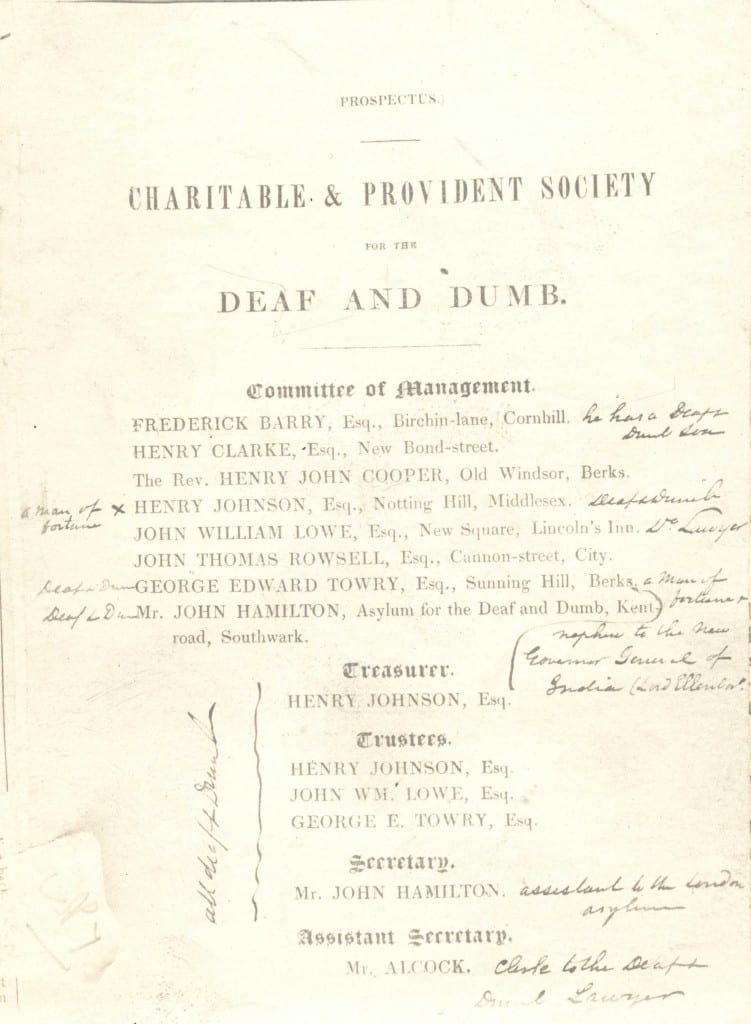Charitable and Provident Society for the Deaf and Dumb 1836-1923
By H Dominic W Stiles, on 9 May 2014
Another photograph of a document, possibly again from an old scrapbook belonging to Matthew Burns. This society was founded by better off Deaf people in aid of poor Deaf people. Note the annotations next to the names, indicating how many were Deaf. Founded in 1836 as the Watson Society, named after Watson of the Old Kent Road Asylum, careful readers of this website may recall that it was later (1843) supported by Charles Dickens.
One of its objects is to grant small annual pensions to those persons, among the poor, who were either born deaf, or lost their hearing before the age of ten years, and who shall have attained the age of sixty years, or who shall have become so infirm as to be incapable of obtaining their livelihood by following their occupations. […] Another, and very important object of this Society, is to encourage industrious and provident habits among deaf and dumb workmen, by conferring further advantages ion those who shall contribute periodical sums in support of this Society; such as the right of priority in receiving pensions, and the benefit of some yearly allowance upon their contributions, should the funds of the Society permit, with a discretionary power to regulate the disposal of such contributions at their own annual meetings, subject to the approval of the Society when in general meeting assembled.
The Monthly Chronicle for 1838, in an article on ‘Progress of the Deaf and Dumb’ (from where the above quotation from the Prospectus comes, p.155 onwards), describes one of their dinners –
They hold regular business meetings, and have had two public dinners in connection with the purposes of the Society. At one of these the writer of this article was present. It was a scene alike strange and interesting. Eight or ten stewards, of whom not more than two or three could hear, received the visitors, superintended the arrangements, and performed all the courteous functions of their office, with a graceful skillthat showed how soon a quick eye may make up for long habitude. The chair was to have been taken by J.W. Lowe, Esq. of Lincoln’s Inn, a conveyancing barrister, of skill and practice in his profession, and who is himself, by that profession, as well as by the energy and attainments of a well cultivated mind, a living monument of social progress of the class to which he belongs; for he too is deaf and dumb, and the first instance of a call to the bar of any person affected by that privation. circumstances having prevented Mr. Lowe’s arrival at the hour for which the dinner had been announced, Mr. J. Hamilton, one of the deaf and dumb teachers at the asylum, was invited to preside, which he did with the ability of a practised chairman. Of about on hundred and twenty persons who dined, a considerable majority were deaf and dumb. The toasts were announced both by words and signs; the chairman having, like many others, so well profited by the artificial faculty of speech cultivated at the Kent Road Establishment, as to render his enunciation very intelligible to others, however inaudible to himself.
We see that George Edward Napoleon Towry (1804-57) was ‘a man of fortune’, as was Henry Johnson. Towry’s grandfather George was a naval officer, who also won £20,000 in the lottery. Towry moved to the Isle of Wight some time before 1851. Try looking them up in the census returns or the Free BMD and see what more you can uncover about them. As you see, the annotation (by Burns I think) says that Towry was a nephew of Lord Ellenborough, Ellenborough’s wife being a Towry, so would be well connected socially.* He was deaf, and I suppose he would have been educated privately. (I hope to add an item about Lowe in a future blog entry. )
)
By 1885 the President was Lord Ebury, who was the relative of the Duke of Westminster involved with the founding of St. Saviour’s Church. There were two Lowes on the committee, Francis and William Ross-Lewin – I imagine they were relatives of J.W. Lowe – which also had the Rev. Stainer, Samuel Bright-Lucas, and Horatio Dain.
The annual reports list those who received pensions, for example in 1885 William George Lyon, then aged 51 and ‘infirm’ was given £4. In 1904 he was still going , aged 70 and collected £10. From the 1901 census returns (Class: RG13; Piece: 1245; Folio: 74; Page: 20) we see that he was born in Southwark in approximately 1833/4.
The society was incorporated in the B.D.D.A. in 1923.
Annual Reports, 1885, 1897, 1903, 1908, 1909, 1911, 1912, 1913, 1914, 1915, 1916
*Updated 4/10/2017 with information about Towry. Note that this family needs researching further as it was the 1st Lord Ellenborough’s son, who was 1st Earl of Ellenborough, who was married to the society beauty Anne Towry (1769-1843). That would make him a cousin of the Governor General.
Rowsell was not deaf but was a solicitor living in Norwood.
One Response to “Charitable and Provident Society for the Deaf and Dumb 1836-1923”
- 1
 Close
Close


[…] Thomas Davidson, R.A. (1842-1919), was an artist of great skill. He specialised in historical naval scenes, and also created memorable paintings illustrating the work of Emily Brontë . He had a close association with St. Saviour’s Church in Oxford Street, London, including being part of the Deaf and Dumb Debating Society, the R.A.D.D., and on the Committee of the Charitable and Provident Society for the Deaf and Dumb (Ephphatha). […]